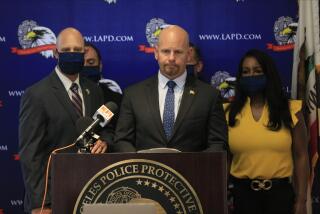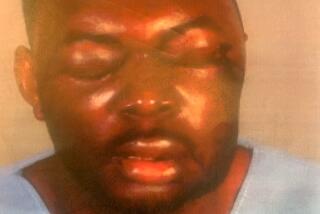Iraqis settle lawsuits over Blackwater shootings
- Share via
Reporting from Durham, N.C. — The security firm formerly known as Blackwater has reached a settlement in seven civil lawsuits filed against it by families of Iraqis killed during what the suits called “senseless slaughter” by company guards.
In an unrelated shooting involving Blackwater guards in Afghanistan in May, two former employees of the North Carolina-based security contractor were charged Thursday with killing two Afghan civilians after a traffic incident.
The legal developments came a week after a federal judge dismissed manslaughter charges against five Blackwater guards charged with killing at least 14 civilians in Baghdad’s Nisoor Square in September 2007. The judge said prosecutors had violated the guards’ rights by using protected statements they gave to State Department officials.
The 2007 killings enraged Iraqis and strained relations between Iraq and the United States. Iraq banned Blackwater, which has since changed its name to Xe.
Two of the civil suits sought damages against the company and its founder, Erik Prince, in connection with the Nisoor Square shootings. The settlement terms were not released.
Other suits involved shootings in Baghdad and Hillah, Iraq, in 2006 and 2007.
In Baghdad on Thursday, a shooting victim who has not settled said he still wanted the guards prosecuted in criminal court.
“Iraqi blood is not that cheap,” said Mehdi Abu Zaman, 45, who said he lost his sight after being shot. “The civil suit is not enough. There is no justification for this. If they gave me all the money in the world, my vision will not come back.”
Another wounded man, Sami Hawas Hamoud Abu Iz, told the Associated Press that the company had offered $100,000 to each family of a person who died and $30,000 to those wounded. He said plaintiffs’ lawyers told victims they might not receive anything if they did not agree to a settlement.
Phone and e-mail messages for Susan L. Burke, a Washington lawyer who represented the plaintiffs, were not returned.
The civil suits alleged that Blackwater “fostered a culture of lawlessness amongst its employees, encouraging them to act in the company’s financial interests at the expense of innocent human life.”
The suits alleged that some of the “shooters,” as the plaintiffs said the guards were known, were “chemically influenced by steroids and other judgment-altering substances.”
The suits accused Prince of making “a series of verbal and written statements that evidenced his support of the wanton killing of those of the Islamic faith.”
A representative for Moyock, N.C.-based Xe did not respond to a request for comment.
Peter H. White, an attorney for the company in Washington, issued this statement: “We are pleased that the original settlement has been affirmed by the plaintiffs. This enables Xe’s new management to move the company forward free of the costs and distraction of ongoing litigation, and provides some compensation to Iraqi families.”
A settlement was reached Nov. 4, according to court documents. But the plaintiffs’ lawyers withdrew Nov. 8 after learning that two plaintiffs objected to it.
After Burke, the lead plaintiffs’ attorney, flew to Istanbul, Turkey, on Nov. 30 to meet with the two plaintiffs, the settlement was reinstated. Burke withdrew the lawsuits in a petition filed in U.S. District Court in Virginia late Wednesday, securing the settlement.
White said a separate civil suit filed in North Carolina by victims of the Nisoor Square shootings was not part of the settlement.
In the Afghanistan shooting, former Blackwater employees Justin Cannon, 27, and Christopher Drotleff, 29, were taken into custody after a federal grand jury in Virginia indicted them on second-degree murder charges.
“There are no grounds for these charges,” said the men’s lawyer, Daniel J. Callahan of Santa Ana. “These men shot to save their own lives.”
The indictment alleges that Cannon and Drotleff, who were in Afghanistan to provide weapons training to the Afghan army, shot and killed two civilians in Kabul, the capital, on the night of May 5. The Americans were among four guards Blackwater fired over the incident, accusing them of violating company policy against alcohol use.
The indictment says Cannon, of Corpus Christi, Texas, fired an assault rifle. Drotleff, of Virginia Beach, Va., fired a handgun, according to the indictment. Two other Blackwater guards at the scene were not charged.
Family members of the slain Afghans told The Times in June that the shootings were unprovoked. They said one of the men was shot after the car in which he was riding came upon a Blackwater vehicle that had been involved in a traffic accident.
The guards ordered the vehicle to stop and turn around, but opened fire as the driver complied, according to relatives. They said the second man was shot as he was walking nearby.
Callahan said one Blackwater vehicle in a two-vehicle convoy was rammed and overturned by a civilian car. When Cannon and Drotleff ran to assist two guards inside the overturned vehicle, the civilian car tried to run them down, he said.
The guards opened fire to save their lives and the lives of their comrades, Callahan said.
Times staff writer Ned Parker in Baghdad contributed to this report.
More to Read
Sign up for Essential California
The most important California stories and recommendations in your inbox every morning.
You may occasionally receive promotional content from the Los Angeles Times.











